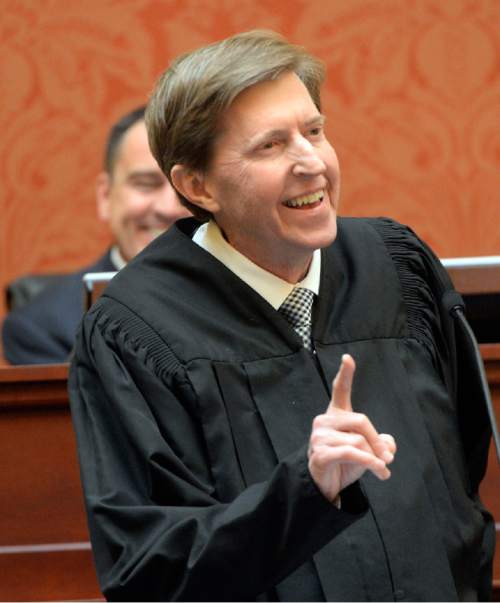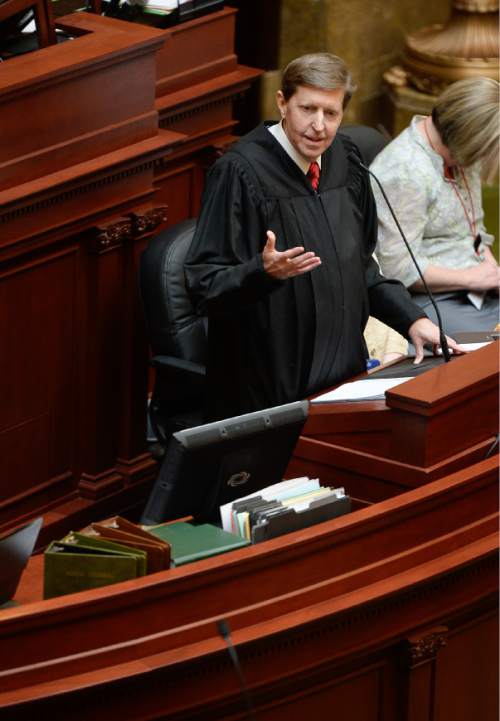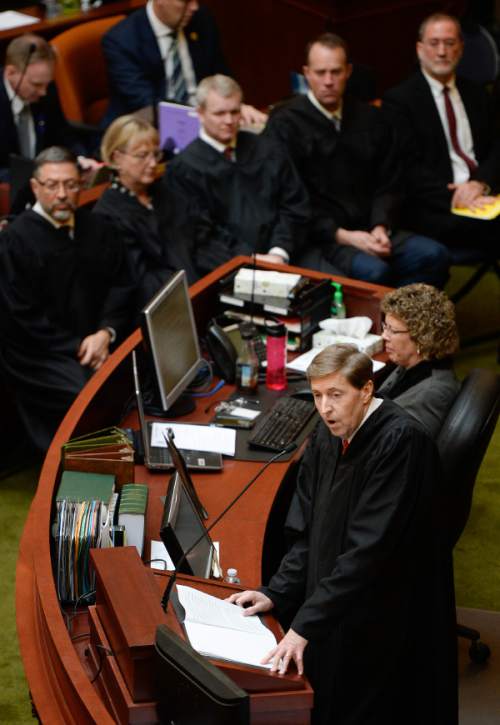This is an archived article that was published on sltrib.com in 2016, and information in the article may be outdated. It is provided only for personal research purposes and may not be reprinted.
Utah Chief Justice Matthew Durrant called on legislators Monday during his State of the Judiciary Address to help provide better treatment resources for criminal defendants as well as give them better defense options.
In light of recent criminal justice reform, he said many people are being released and recommended for treatment instead of incarcerated, but "inadequate treatment resources" are inhibiting them from becoming healthy, law-abiding citizens.
"The [Justice Reinvestment Initiative] was predicated on the demonstrated fact that it is more effective to treat substance abuse and mental health needs — which prevents recidivism — than to imprison," he said, but the state has failed to provide the treatment programs for these people and necessary funding to replace previous practices.
"If treatment is unavailable, not only will the system fail to improve, it will likely worsen," he said. "Putting offenders who would previously have gone to jail or prison back into the community, without treatment, will almost certainly increase crime."
Leaving out treatment options, he said, throws off the balance of this law and prevents it from fulfilling its original purpose.
He also expressed concerns pointed out by a judicial council committee, which identified three problems the state has with fulfilling its constitutional mandate to provide lawyers to indigent defendants.
They said lack of oversight on how counties and municipalities comply with that responsibility, contracts creating disincentives for lawyers who represent those people and informational and procedural inconsistency across the board has left constituents feeling dissatisfied.
"While everyone involved in addressing this issue agreed that there are shortcomings in Utah's indigent-defense system, they also agreed that the needed solutions are apparent, and well within reach," Durrant said.
The committee recommended a "statewide, representative commission be created, which would set data collection standards, compile data and monitor the appointment and performance of defense counsel," Durrant said.
Legislation for that specific solution will be presented later in the session by Sen. Todd Weiler, R-Woods Cross, and Rep. Dan McCay, R-Riverton.
Other recommended solutions include reviewing and reforming contracts for defense counsels and holding training sessions to make procedures throughout the state more uniform.
Durrant also highlighted concerns with the bail process, specifically noting the challenges that come to defendants who don't have sufficient funds to make bail.
Those who can't are kept in jail until their trial, "which means separation from their family and often a loss of their employment, with the accompanying loss of income."
Time in jail, he said, exposes them to a criminal culture and increases the likelihood of criminal activity in their future.
"And remember that for all of these people this all occurs before they have been tried, so they are presumed innocent," he said.
Sen. Lyle Hillyard, R-Logan, will sponsor legislation during the session which includes recommendations for pre-trial release practices that will "better ensure fairness, protect individual rights and promote public safety."
"Unlike in so many other important government functions, in these three areas, Utah is not ahead of the pack, but rather in the middle of it. ... And we need to catch up," he said.
Nevertheless, one area in which the state is "on the cutting edge of innovation and public service," is a self-help center which provides direct legal assistance to "tens of thousands" who either can't afford legal representation or don't think they should have to hire a lawyer.
Utah is also using "qualified non-lawyers to practice law, on a carefully defined basis, in ... debt collection, landlord-tenant and family law," Durrant said.
Overall the state of the judiciary is "sound," he said. Data shows that 95 percent of Utahns who have dealt with the justice system feel they're being treated with courtesy and respect.
"To give you some frame of reference, a recent national poll found that only 66 percent of respondents agreed with [that] statement," Durrant said.
The state chief justice said he's proud of Utah for having "one of the strongest benches in the country."







